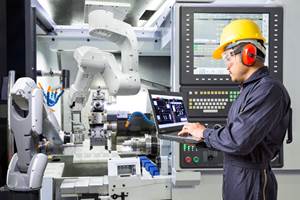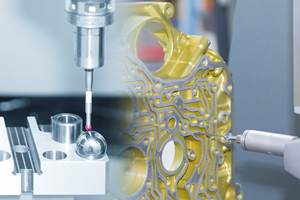Do-It-Yourself Machine Tool Calibration
The trend toward higher accuracy parts continues largely because manufacturers are finding that higher accuracy parts reduce assembly time and lower warranty costs. The machine tools have to be kept within tolerance, which means calibration at regular intervals.
Share




The trend toward higher accuracy parts continues largely because manufacturers are finding that higher accuracy parts reduce assembly time and lower warranty costs. But accurate parts require more than expensive machine tools. The machine tools have to be kept within tolerance, which means calibration at regular intervals.
Options for calibration have been limited. Historically, the choice has been to utilize an outside service or to purchase a calibration system and do it yourself. While large companies could absorb the cost, small companies might not be able to afford either option. However, one company has recognized the need to make do-it-yourself calibration more affordable.
Optodyne, Inc. (Compton, California), which specializes in laser calibration systems for machine tools, has introduced a system for the linear calibration of machine tools called the MCV-500. It is priced under $10,000. This calibration system can be used for many different applications, such as linear calibration of CNC machine tools, coordinate measuring machines, leadscrews and digital readouts; and for quality control maintenance and ultra-precision positioning.
The system consists of two major components: a laser head assembly, which requires only a small percentage of the return beam, and a retroreflector. Both components are mounted on the machine tool, not on a separate tripod. According to the company, eliminating the need for a tripod increases accuracy, convenience and time-savings. Optodyne also says that the system can be setup in about half the time a conventional laser calibration system requires. In many applications, fixtures and tooling do not have to be removed and enclosures do not have to be dismantled. Most experienced CNC operators can learn to use the MCV-500 from the manual in less than three hours, the company says.
The system's laser head features a stability check of better than 0.1 PPM (parts per million), accuracy of 1.0 PPM and resolution up to 1 microinch and automatically adjusts for environmental factors, including barometric pressure, air temperature and material temperature, to compensate for thermal expansion. The MCV-500 is calibrated and traceable to NIST and its software analysis supports NMTBA, VDI, ISO and ASME B5.54 standards.
Based on Optodyne's patented Laser Doppler Displacement Meter (LDDM) technology, the system works by reflecting a modulated laser beam off a movable target. The beam is detected and processed for displacement information used by the control to determine position.
ISO 9000 certification and other quality control programs are increasingly a requirement for becoming an approved vendor by many manufacturers. All quality control programs require calibration of machine tools, generally every six months. While laser calibration is not specified, it is widely regarded as the most accurate method for machine tool calibration.
Documentation of calibration is a basic component of quality control programs. To make data collection analysis easier, the MCV-500 can be connected to most Windows-compatible notebook or desktop computers through an RS-232 port. Windows-supported software provided with the system enables collection and analysis of data. The software automatically collects data; displays data in tabular and graphical formats on the screen; stores data on the hard drive; and can print data for a permanent record.
A benefit of automatic data collection is that it reduces the potential for human error. The table is moved into position with the control. The laser calibration system automatically senses table movement, so data collection is automatically triggered after a user-defined interval.
There are more benefits to calibration than higher accuracy parts. Regularly scheduled calibration can help identify problems with machine tools, such as bad bearings, faulty servos, slip-stick conditions, and so on. This early detection enables the shop to schedule maintenance and avoid unexpected downtime, particularly during critical production runs. And taking care of problems early often means that repairs won't cost as much and they won't contribute to other, more serious problems.
Related Content
6 Machine Shop Essentials to Stay Competitive
If you want to streamline production and be competitive in the industry, you will need far more than a standard three-axis CNC mill or two-axis CNC lathe and a few measuring tools.
Read MoreThe Link Between CNC Process Control and Powertrain Warranties
Ever since inventing the touch-trigger probe in 1972, Sir David McMurtry and his company Renishaw have been focused on achieving process control over its own manufacturing operations. That journey has had sweeping consequences for manufacturing at large.
Read MoreRethink Quality Control to Increase Productivity, Decrease Scrap
Verifying parts is essential to documenting quality, and there are a few best practices that can make the quality control process more efficient.
Read MoreOrthopedic Event Discusses Manufacturing Strategies
At the seminar, representatives from multiple companies discussed strategies for making orthopedic devices accurately and efficiently.
Read MoreRead Next
Registration Now Open for the Precision Machining Technology Show (PMTS) 2025
The precision machining industry’s premier event returns to Cleveland, OH, April 1-3.
Read MoreBuilding Out a Foundation for Student Machinists
Autodesk and Haas have teamed up to produce an introductory course for students that covers the basics of CAD, CAM and CNC while providing them with a portfolio part.
Read MoreSetting Up the Building Blocks for a Digital Factory
Woodward Inc. spent over a year developing an API to connect machines to its digital factory. Caron Engineering’s MiConnect has cut most of this process while also granting the shop greater access to machine information.
Read More






























